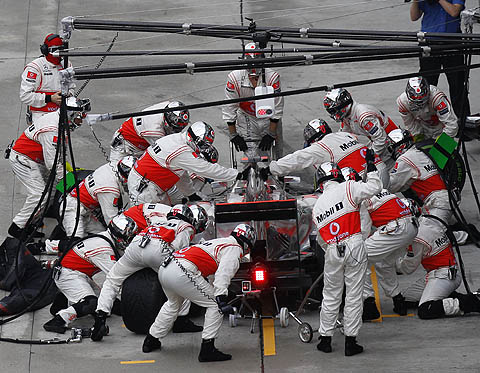


26/04/2012
FEATURE BY MAT COCH
 |
There is a little known unit of time called the New York second. According to author Terry Pratchett it's the time between the traffic lights turning green and the cab behind honking.
Patience in traffic is often at a premium as we all try to out wit our fellow road users, weaving in to what we predict will be the 'fast' lane - not that there ever is one - or darting off in to side streets to avoid bottlenecks.
Generally the only pressure on us is getting home before our dinner gets cold (or ends up in the dog), or picking the kids up from school on time. There are rarely millions of dollars on offer if we reach a destination first.
Much the same principle applies in motor racing, with the added incentive of fame, glory, women and money. The eyes of the world tune in to watch the fastest men in the world not only drive fast but try to outwit one another. Motor racing is the challenge of driving cars as fast as possible, and if one can at all manage it, faster than everyone else.
In modern racing that means swapping old tyres for new at a certain point. When the best time to do so is calculated in advance based on factors like tyre wear, track position and the current race scenario. Jarno Trulli was also once a factor of those equations.
Pit stops are par for the course these days, and that is no slight on Pirelli. The Italian company, which I've been critical of in the past, has created a range of tyres which adds to the spice of the race. As a result each race is a comparative vindaloo and I am not ashamed to admit that they were right and I was wrong.
However what I don't believe I am wrong about is pit stops. They are needed and break up the race, but is there any reason they need to be such a critical factor in its outcome?
The FIA recently took the decision to ban the use of helium at pit stops because it added expense and, since everyone was doing it, little else. There was no advantage and so it was rightly banned.
Pit stops are much faster now refuelling has been outlawed, of course. Where once the men on the wheels could take their time while the fuel went in they are now the deciding factor for a good or bad stop. It's all over in a moment, a couple of New York seconds perhaps, and creates one of the most tense moments of a mechanic's job.
Drivers are paid to extract the most out of their cars. They receive fame and glory beyond the comprehension of us mere mortals as rewards for their skill and bravery. Mechanics receive a salary. They don't get paid extra to stand in the pit lane with cars barrelling towards them at 100kph. They are exposed to stresses beyond what could reasonably be expected of them in their job description, and do so without a fuss.
They can however have a serious impact on the outcome of their driver's race. A good stop could see them gain a place or two while a bad stop could end the race, as it did for Michael Schumacher in China.
McLaren did not have an easy time of it in Bahrain and I don't think Lewis Hamilton helped the situation. He had a slow pit stop or two because a mechanic made a mistake. He is human and nobody will be harder on him than himself. Hamilton's questioning over the radio is unlikely to have helped. He would have been better sending a message of encouragement and rallying the team but instead criticised it. Formula One is a team sport.
The sport has such fine margins between success and failure but realistically do we care if a pit stop takes two seconds as opposed to five or six? What does it add to the sport beyond the added variable of an under paid mechanic losing his bottle? Formula One is a contest between the fastest drivers in the world, not the fastest pit crews. Losing competitive cars and drivers because a mechanic crumbled under the immense pressure of a three second pit stop is robbing us all of the spectacle.
Ferrari has managed pit stops just a jiffy longer than two seconds in practice. In the heat of the race they're a smidgen longer but they are still frighteningly fast. Who knows what impact Lewis Hamilton's Bahrain race will have come seasons end - it may well be the difference between first or second in the Constructors Championship. Time is money and it is unfair for that to hang so critically around the neck of the mechanics.
It would be simple to slow pit stops from three seconds to six. A set of spec rattle guns which operate at a defined rpm and regulations over the thread on the axle and nut are simple solutions. It would likely save money too, since teams no longer invest time finding more efficient thread lengths, like Ferrari has done. What's more, doing so would likely take some of the pressure off those in the pit lane and put the emphasis back where it should be; on fast men driving fast cars.
Formula One is about drivers and cars, and to a lesser extent teams. It is not about Bob the front jack man, or Trevor the right front wheel nut polisher. They are crucial members of the team but they should not be critical members. Lewis Hamilton is a critical member, as are those on the pit wall, and it is they who should bear responsibility for the team's fortunes. Charging a lowly paid mechanic with critical tasks for no extra reward will only end in disappointment and disillusion.
To check out previous features from Mat, click here